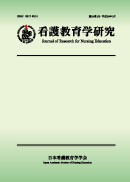Volume 10, Issue 1
Displaying 1-15 of 15 articles from this issue
- |<
- <
- 1
- >
- >|
-
Article type: Cover
2001 Volume 10 Issue 1 Pages Cover1-
Published: March 31, 2001
Released on J-STAGE: November 10, 2016
Download PDF (22K) -
Article type: Index
2001 Volume 10 Issue 1 Pages Toc1-
Published: March 31, 2001
Released on J-STAGE: November 10, 2016
Download PDF (37K) -
Article type: Article
2001 Volume 10 Issue 1 Pages 1-14
Published: March 31, 2001
Released on J-STAGE: November 10, 2016
Download PDF (2092K) -
Article type: Article
2001 Volume 10 Issue 1 Pages 15-28
Published: March 31, 2001
Released on J-STAGE: November 10, 2016
Download PDF (2174K) -
Article type: Article
2001 Volume 10 Issue 1 Pages 29-42
Published: March 31, 2001
Released on J-STAGE: November 10, 2016
Download PDF (2139K) -
Article type: Article
2001 Volume 10 Issue 1 Pages 43-56
Published: March 31, 2001
Released on J-STAGE: November 10, 2016
Download PDF (2165K) -
Article type: Article
2001 Volume 10 Issue 1 Pages 57-60
Published: March 31, 2001
Released on J-STAGE: November 10, 2016
Download PDF (689K) -
Article type: Appendix
2001 Volume 10 Issue 1 Pages 61-
Published: March 31, 2001
Released on J-STAGE: November 10, 2016
Download PDF (86K) -
Article type: Appendix
2001 Volume 10 Issue 1 Pages 62-63
Published: March 31, 2001
Released on J-STAGE: November 10, 2016
Download PDF (169K) -
Article type: Appendix
2001 Volume 10 Issue 1 Pages 63-64
Published: March 31, 2001
Released on J-STAGE: November 10, 2016
Download PDF (153K) -
Article type: Appendix
2001 Volume 10 Issue 1 Pages 64-
Published: March 31, 2001
Released on J-STAGE: November 10, 2016
Download PDF (66K) -
Article type: Appendix
2001 Volume 10 Issue 1 Pages 65-
Published: March 31, 2001
Released on J-STAGE: November 10, 2016
Download PDF (75K) -
Article type: Appendix
2001 Volume 10 Issue 1 Pages 66-
Published: March 31, 2001
Released on J-STAGE: November 10, 2016
Download PDF (32K) -
Article type: Index
2001 Volume 10 Issue 1 Pages Toc2-
Published: March 31, 2001
Released on J-STAGE: November 10, 2016
Download PDF (40K) -
Article type: Cover
2001 Volume 10 Issue 1 Pages Cover2-
Published: March 31, 2001
Released on J-STAGE: November 10, 2016
Download PDF (16K)
- |<
- <
- 1
- >
- >|
